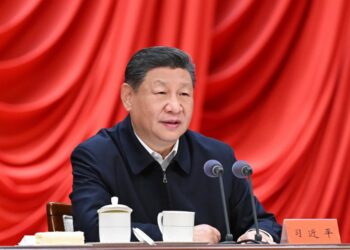Photo taken on July 15, 2025 showing the site of the fuselage equipment project, jointly launched by Airbus and the Avic Xi’an Aircraft International (Tianjin) Corporation (Avic Xat), in Tianjin, in northern China. (Photo: Xinhua)
An A321 fuselage equipment project, a flagship monocourloiring aircraft of Airbus, was recently launched by the European aeronautical manufacturer Airbus and the Aviation Industry Corporation of China (AVIC), in Tianjin, in northern China.
This is the first time that China has achieved this process of complex equipment for the best -selling aircraft in Airbus in its category. This advance is proof of the European group’s confidence in the tenacity of the Chinese supply chain and in its capacity to enlarge its local industrial presence.
This fuselage equipment operation is to install and test the essential components of the device systems before the final assembly. The front and rear parts of the first A321 concerned arrived in early July to the port of Tianjin by sea, before being transferred to the production site of the Avic Xi’an Aircraft International (Tianjin) Corporation (Avic Xat), a subsidiary of the Avic Xi’an Aircraft Industry Group Co., Ltd.
This milestone marks technological progress, but also a new chapter in industrial cooperation between Airbus and China, which is part of a long -term partnership, nourished by the spectacular growth of Chinese civil aviation and the growing integration of the country in world value chains in the aeronautical sector.
Over the decades, Chinese civil aviation experienced an average annual growth of around 20% of total traffic over a long period. Successive Airbus models, including the A300, A340, A320, A320, A380 and A350, joined the Chinese fleets, and allowed the creation of a network of sprawling air roads, both national and international.
Specific models have taken important steps. The A340 was the first to open a polar road; The A319 and A330 successfully flew over the Qinghai-Xizang plateau; The A320 family has introduced an electric flight control system; The A350 has paved the way for ultra-long-haul flights; And Airbus cargo planes have strengthened air logistics.
Airbus has established itself both as a witness and actor in the rapid development of aviation in China.
Today, China is the second world market for air transport and the largest single national market for Airbus concerning commercial aircraft. With a fleet of more than 4,300 devices, more than 2,200 of which are Airbus planes, Chinese aviation has moved from the status of follower to that of leader.
According to forecasts from the global Airbus 2025 market market, the annual number of air trips per capita in China will drop from 0.6 in 2024 to 1.84 in 2044. Over the next 20 years, China is expected to become the world’s largest air transport market, with a need for 9,570 new devices, almost a quarter of global demand.
“Airbus intends to continue its development in China,” says Christian Scherer, director general of Airbus commercial aircraft. “And this goes from the second final assembly chain (Final Assembly Line, Fal) to Tianjin, to the development of new services and assistance capacities, especially in the field of digital services, without forgetting, of course, our innovative collaboration with Chinese partners in the field of sustainable fuels for aviation.”
This cooperation today covers the entire aeronautical life cycle: R&D and design, manufacturing, final assembly, operational maintenance, up to the recycling of end -of -life products.
Airbus and its Chinese partners have set up installations throughout China: training, engineering and customer assistance centers in Beijing, FA of the A320 family and finalization and delivery center for coarse porters in Tianjin, Airbus life cycle service center in Chengdu, Center for the Manufacturing of Composite Materials in Harbin, Innovation Center in Shenzhen and Suzhou. Today, Airbus employs more than 2,300 people in China.
According to George XU, Airbus Executive Vice-President and CEO of Airbus China, “as a trusted partner of long-term China, Airbus will continue to expand its industrial footprint in the country, to promote joint progress over the entire value chain, and to contribute to the high quality development of Chinese aviation”.








